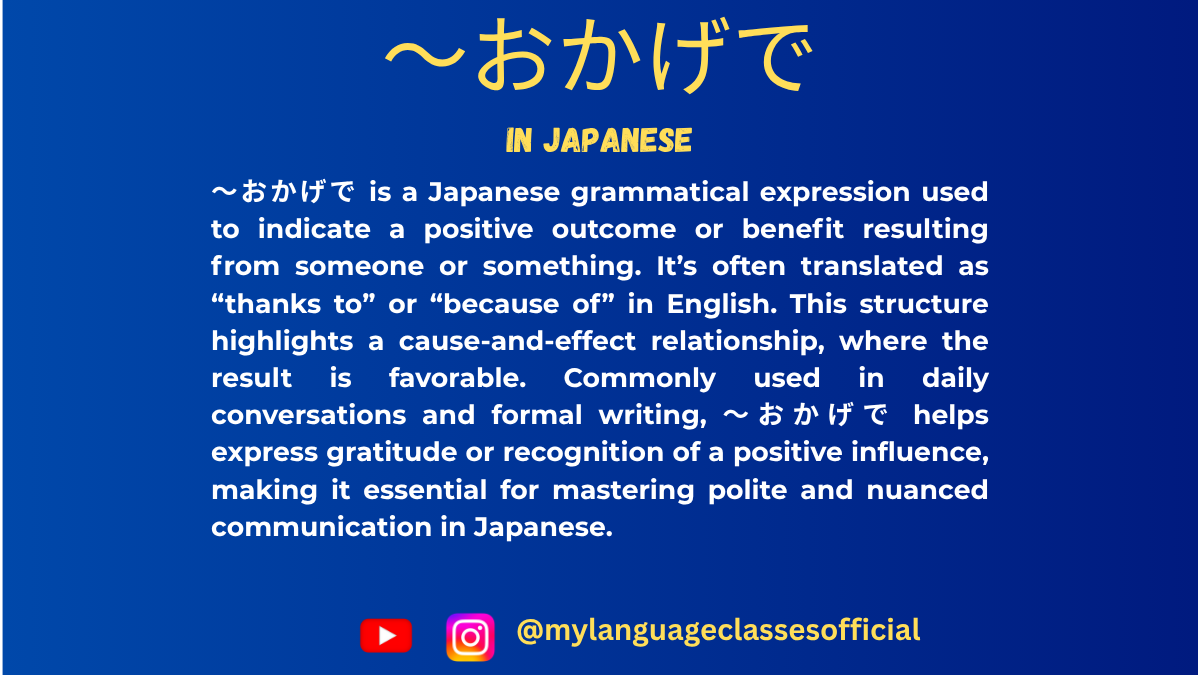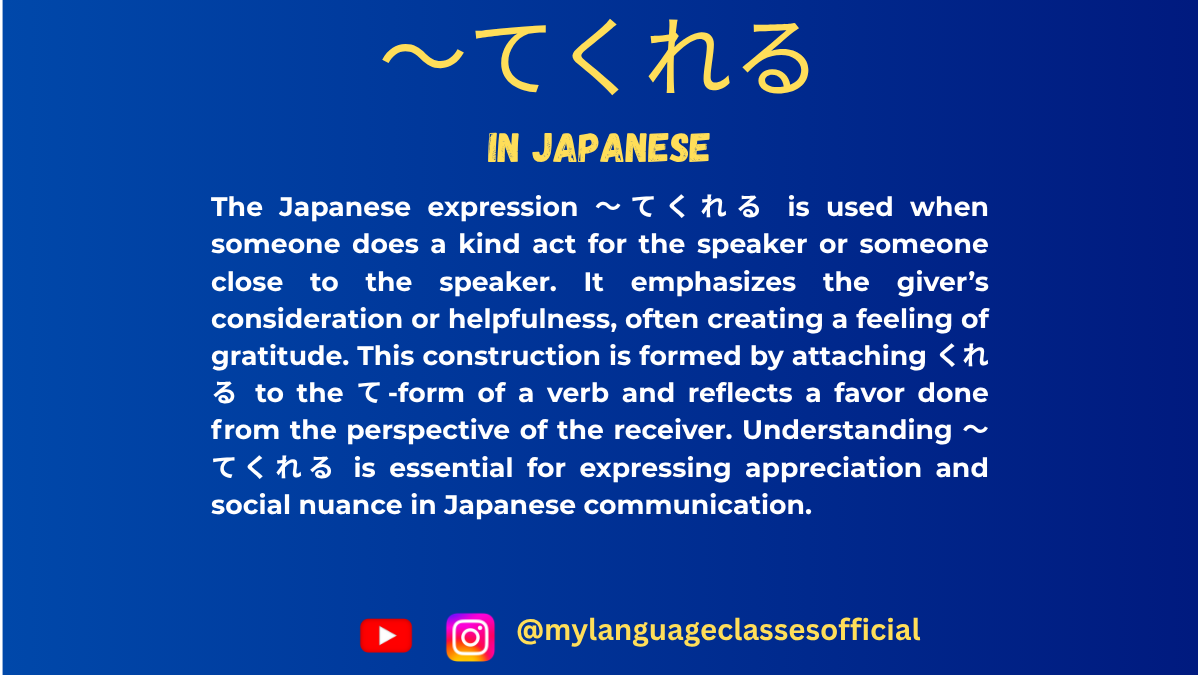Your cart is currently empty!
Tag: Japanese gratitude expressions
-

Understanding 〜おかげで in Japanese | My Language Classes
Understanding 〜おかげで
In Japanese, 〜おかげで (okage de) is a grammar point used to express gratitude or acknowledgment for a positive outcome that resulted from someone’s help, effort, or a specific situation. It translates to “thanks to,” “because of,” or “due to” in English. While it is often used in positive contexts, it can also be used sarcastically to imply a negative outcome. Understanding how to use 〜おかげで correctly is essential for expressing cause and effect in Japanese, especially when giving credit or showing appreciation.
Formation of 〜おかげで
The 〜おかげで structure can be formed with verbs, nouns, and adjectives. Here’s how it works:
1. With Verbs
- Verb (plain past tense) + おかげで
Example:
勉強したおかげで (benkyou shita okage de) – Thanks to studying
2. With Nouns
- Noun + の + おかげで
Example:
先生のおかげで (sensei no okage de) – Thanks to the teacher
3. With Adjectives
- い-Adjective (plain past tense) + おかげで
Example:
楽しかったおかげで (tanoshikatta okage de) – Thanks to it being fun - な-Adjective + だった + おかげで
Example:
静かだったおかげで (shizuka datta okage de) – Thanks to it being quiet
Usage of 〜おかげで
〜おかげで is used in various situations to express gratitude or acknowledge the cause of a positive outcome. Here are some common scenarios:
- Expressing Gratitude: Thanking someone for their help or effort.
Example: あなたのおかげで成功しました。 (Anata no okage de seikou shimashita.) – Thanks to you, I succeeded. - Acknowledging a Situation: Recognizing a situation that led to a positive result.
Example: いい天気のおかげでピクニックが楽しめました。 (Ii tenki no okage de pikunikku ga tanoshimemashita.) – Thanks to the good weather, we enjoyed the picnic. - Sarcastic Usage: Implying a negative outcome (often used humorously or ironically).
Example: あなたのおかげで遅刻しました。 (Anata no okage de chikoku shimashita.) – Thanks to you, I was late.
List of Verbs, Nouns, and Adjectives with 〜おかげで Form
Word Type Word 〜おかげで Form Example Sentence (Japanese) Romaji Version English Meaning Verb 勉強する (study) 勉強したおかげで 勉強したおかげで合格した。 Benkyou shita okage de goukaku shita. Thanks to studying, I passed the exam. Verb 頑張る (work hard) 頑張ったおかげで 頑張ったおかげで成功した。 Ganbatta okage de seikou shita. Thanks to working hard, I succeeded. Noun 先生 (teacher) 先生のおかげで 先生のおかげで日本語が上手になった。 Sensei no okage de nihongo ga jouzu ni natta. Thanks to the teacher, my Japanese improved. Noun 友達 (friend) 友達のおかげで 友達のおかげで楽しかった。 Tomodachi no okage de tanoshikatta. Thanks to my friend, it was fun. い-Adjective 楽しい (fun) 楽しかったおかげで 楽しかったおかげで元気になった。 Tanoshikatta okage de genki ni natta. Thanks to it being fun, I felt energized. い-Adjective 早い (early) 早かったおかげで 早かったおかげで間に合った。 Hayakatta okage de maniatta. Thanks to being early, I made it on time. な-Adjective 静か (quiet) 静かだったおかげで 静かだったおかげで集中できた。 Shizuka datta okage de shuuchuu dekita. Thanks to it being quiet, I could focus. な-Adjective 便利 (convenient) 便利だったおかげで 便利だったおかげで時間が節約できた。 Benri datta okage de jikan ga setsuyaku dekita. Thanks to it being convenient, I saved time.
More Example Sentences
- 友達のおかげで新しい仕事を見つけました。
Tomodachi no okage de atarashii shigoto o mitsukemashita.
Thanks to my friend, I found a new job. - 雨のおかげで庭の花がきれいに咲きました。
Ame no okage de niwa no hana ga kirei ni sakimashita.
Thanks to the rain, the flowers in the garden bloomed beautifully. - 彼のアドバイスのおかげで問題が解決しました。
Kare no adobaisu no okage de mondai ga kaiketsu shimashita.
Thanks to his advice, the problem was solved. - 勉強したおかげで試験に合格しました。
Benkyou shita okage de shiken ni goukaku shimashita.
Thanks to studying, I passed the exam. - 先生のおかげで日本語が上手になりました。
Sensei no okage de nihongo ga jouzu ni narimashita.
Thanks to the teacher, my Japanese improved. - 早く起きたおかげで朝ごはんを食べられました。
Hayaku okita okage de asagohan o taberaremashita.
Thanks to waking up early, I could eat breakfast. - 彼女のおかげで楽しい時間を過ごせました。
Kanojo no okage de tanoshii jikan o sugosemashita.
Thanks to her, I had a great time. - 天気が良かったおかげで遠足が楽しめました。
Tenki ga yokatta okage de ensoku ga tanoshimemashita.
Thanks to the good weather, the field trip was enjoyable. - あなたのおかげで自信がつきました。
Anata no okage de jishin ga tsukimashita.
Thanks to you, I gained confidence. - 便利なアプリのおかげで道に迷いませんでした。
Benri na apuri no okage de michi ni mayoimasen deshita.
Thanks to the convenient app, I didn’t get lost.
Things to Keep in Mind
- Positive vs. Sarcastic Usage: While 〜おかげで is mostly used for positive outcomes, it can also be used sarcastically. Pay attention to the context.
- Politeness: When expressing gratitude, 〜おかげで is polite enough for most situations. However, adding です or ます forms can make it more formal.
- Avoid Overuse: Use 〜おかげで when the cause and effect are clear. Overusing it can make your speech sound unnatural.
- Subject Awareness: The subject of the sentence is often omitted in Japanese, so ensure the context makes it clear who or what is being thanked.
Fill in the Blanks
- 彼の助けのおかげで、__________。
- 勉強したおかげで、__________。
- 先生のおかげで、__________。
- 天気が良かったおかげで、__________。
- 友達のおかげで、__________。
- 早く起きたおかげで、__________。
- 便利なアプリのおかげで、__________。
- 静かだったおかげで、__________。
- 彼女のおかげで、__________。
- 頑張ったおかげで、__________。
Answers:
- 彼の助けのおかげで、問題が解決しました。
- 勉強したおかげで、試験に合格しました。
- 先生のおかげで、日本語が上手になりました。
- 天気が良かったおかげで、遠足が楽しめました。
- 友達のおかげで、楽しい時間を過ごせました。
- 早く起きたおかげで、朝ごはんを食べられました。
- 便利なアプリのおかげで、道に迷いませんでした。
- 静かだったおかげで、集中できました。
- 彼女のおかげで、自信がつきました。
- 頑張ったおかげで、成功しました。
Conclusion
〜おかげで is a versatile and essential grammar point in Japanese that allows you to express gratitude, acknowledge positive outcomes, or even add a touch of sarcasm. By mastering its formation and usage, you can effectively communicate cause-and-effect relationships in various contexts. Practice using 〜おかげで in your daily conversations, and soon it will become a natural part of your Japanese language skills. Keep studying, and 頑張ってください! (Ganbatte kudasai!)
If you enjoyed this lesson, be sure to check out more posts like this on my blog at My Language Classes. Don’t forget to subscribe my YouTube channel and follow me on Instagram for the latest language learning tips and lessons. Leave a comment below to share your thoughts, or ask any questions you have about nouns.
Happy learning! 😊
- Verb (plain past tense) + おかげで
-

How to Use 〜てくれる | My Language Classes
Understanding “〜てくれる” in Japanese
The Japanese expression 〜てくれる is a key grammatical structure used to describe actions done for the speaker’s benefit or someone close to them. It conveys gratitude and appreciation towards the doer. Let’s explore its usage in various contexts and provide a list of situations where “〜てくれる” is used.
What is 〜てくれる?
“〜てくれる” is derived from the verb くれる, which means “to give.” When attached to the て-form of a verb, it expresses that someone performs an action for the speaker (or someone in the speaker’s inner circle). It implies a sense of appreciation and goodwill.
- Structure:
[Person] が [Verb (て-form)] くれる
(Someone does something for me or someone in my group.) - Example:
- 友達が宿題を手伝ってくれた。
(Tomodachi ga shukudai o tetsudatte kureta.)
→ “My friend helped me with my homework.” - 先生が日本語を教えてくれました。
(Sensei ga Nihongo o oshiete kuremashita.)
→ “The teacher kindly taught me Japanese.”
- 友達が宿題を手伝ってくれた。
Situations Where 〜てくれる is Used
1. When Someone Helps You
Used when someone provides assistance that benefits the speaker.
- Example:
- 兄が荷物を運んでくれた。 (Ani ga nimotsu o hakonde kureta.)
→ “My older brother carried my luggage for me.”
- 兄が荷物を運んでくれた。 (Ani ga nimotsu o hakonde kureta.)
2. When Someone Gives You Something
Used when someone gives you an object (related to くれる itself).
- Example:
- 友達がプレゼントを買ってくれた。 (Tomodachi ga purezento o katte kureta.)
→ “My friend bought me a present.”
- 友達がプレゼントを買ってくれた。 (Tomodachi ga purezento o katte kureta.)
3. When Someone Does a Favor for You
Used when someone voluntarily does something kind.
- Example:
- 彼が傘を貸してくれた。 (Kare ga kasa o kashite kureta.)
→ “He lent me an umbrella.”
- 彼が傘を貸してくれた。 (Kare ga kasa o kashite kureta.)
4. When Someone Teaches or Instructs You
Used when someone imparts knowledge or skills.
- Example:
- 先生が漢字の書き方を教えてくれた。 (Sensei ga kanji no kakikata o oshiete kureta.)
→ “The teacher taught me how to write kanji.”
- 先生が漢字の書き方を教えてくれた。 (Sensei ga kanji no kakikata o oshiete kureta.)
5. When Someone Listens to You
Used when someone listens or gives attention to you.
- Example:
- 友達が悩みを聞いてくれた。 (Tomodachi ga nayami o kiite kureta.)
→ “My friend listened to my worries.”
- 友達が悩みを聞いてくれた。 (Tomodachi ga nayami o kiite kureta.)
6. When Someone Accompanies You
Used when someone goes with you somewhere.
- Example:
- 母が病院まで一緒に行ってくれた。 (Haha ga byouin made issho ni itte kureta.)
→ “My mother went to the hospital with me.”
- 母が病院まで一緒に行ってくれた。 (Haha ga byouin made issho ni itte kureta.)
7. When Someone Encourages or Supports You
Used when someone gives encouragement.
- Example:
- 彼が試験の前に励ましてくれた。 (Kare ga shiken no mae ni hagemashite kureta.)
→ “He encouraged me before the exam.”
- 彼が試験の前に励ましてくれた。 (Kare ga shiken no mae ni hagemashite kureta.)
8. When Someone Waits for You
Used when someone waits patiently for you.
- Example:
- 友達が駅で待ってくれた。 (Tomodachi ga eki de matte kureta.)
→ “My friend waited for me at the station.”
- 友達が駅で待ってくれた。 (Tomodachi ga eki de matte kureta.)
9. When Someone Fixes or Repairs Something for You
Used when someone fixes something for your benefit.
- Example:
- 父が自転車を直してくれた。 (Chichi ga jitensha o naoshite kureta.)
→ “My father fixed my bicycle.”
- 父が自転車を直してくれた。 (Chichi ga jitensha o naoshite kureta.)
10. When Someone Invites You or Gives You a Treat
Used when someone invites or pays for you.
- Example:
- 彼がコーヒーをおごってくれた。 (Kare ga koohii o ogotte kureta.)
→ “He treated me to coffee.”
- 彼がコーヒーをおごってくれた。 (Kare ga koohii o ogotte kureta.)
Notes on Usage
- Subject Consideration:
- The giver of the action is the grammatical subject, not the receiver.
- Example:
- 彼がケーキを作ってくれた。 (He made a cake for me.)
- 私にケーキを作ってくれた is unnatural (omit 私に).
- Politeness Levels:
- Casual: 〜てくれる
- Polite: 〜てくれます
- Past polite: 〜てくれました
- Not Used for Superior-to-Subordinate Actions:
- You cannot use 〜てくれる when a subordinate (like a junior worker) does something for a superior (like a boss). Instead, use 〜てくださいました (keigo).
Conclusion
The expression 〜てくれる is an essential part of Japanese communication, showing gratitude when someone does something beneficial for the speaker. By understanding the different contexts in which it is used, learners can express appreciation naturally and appropriately in Japanese conversations.
Do you have any questions about 〜てくれる? Let me know in the comments! 😊
If you enjoyed this lesson, be sure to check out more posts like this on my blog at My Language Classes. Don’t forget to subscribe my YouTube channel and follow me on Instagram for the latest language learning tips and lessons. Leave a comment below to share your thoughts, or ask any questions you have about nouns.
Happy learning! 😊
- Structure:
